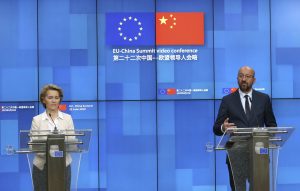Initially planned for March 2020, the 22nd annual EU-China Summit was held by video-link on June 22 due to the COVID-19 pandemic. This was the second EU-China summit after the March 2019 publication of the European Commission’s paper “EU-China – A strategic outlook,” which labeled China as a “systemic rival.” The paper recognized that “the balance of challenges and opportunities presented by China has shifted” and pointed out that China promoted “alternative models of governance” to those of the EU. The paper also listed a number of other concerns including, inter alia, trade issues and cybersecurity.
Shortly after the publication of the paper, in April 2019, the EU’s foreign direct investment (FDI) screening mechanism (proposed in 2017) entered into force to investigate foreign takeovers of strategic assets including key infrastructure and high technology. Although applicable to investment from all foreign countries, the mechanism is mainly directed at China. This is even more relevant in the wake of the coronavirus crisis, when many EU member states are in need of cash and tempted to sell off strategic assets. Decisions on FDI under the mechanism are ultimately left to member states, but the mechanism nevertheless represents a clear step forward in this area.
When the EU and China held their annual summit in July 2019, they managed after much negotiation to agree on a joint statement including Chinese commitments on investment rules and market reciprocity, which China did not deliver upon as the EU had expected. Since the 2019 joint statement was agreed to there has also been backsliding on human rights in China, including the arbitrary detention of foreigners and deeply concerning reports on the treatment of ethnic minorities.
The 2020 summit was colored by those developments, as well as the consequences of the COVID-19 pandemic and events in Hong Kong. When the pandemic hit Europe, individual EU member states initially refused to share medical supplies. China promptly stepped in to furnish them. However, China’s rather clunky propaganda left a bad taste, especially since European leaders were asked to be discreet about the aid they sent to Wuhan at the beginning of the COVID-19 pandemic. By contrast, China has trumpeted its “mask diplomacy,” often conflating sales with aid and suggesting that the EU was not there to help. Beijing’s propaganda drew concern in Brussels, as seen in a blog post by EU High Representative Josep Borrell on a “battle of narratives” between the EU and China. China’s Ministry of Foreign Affairs and state-controlled media even created fake news suggesting the virus did not originate in Wuhan.
But the paradox of propaganda, as exposed by Pew Research polling, is that the more Europeans were exposed to China the less they liked it. European public opinion thus turned against China.

































